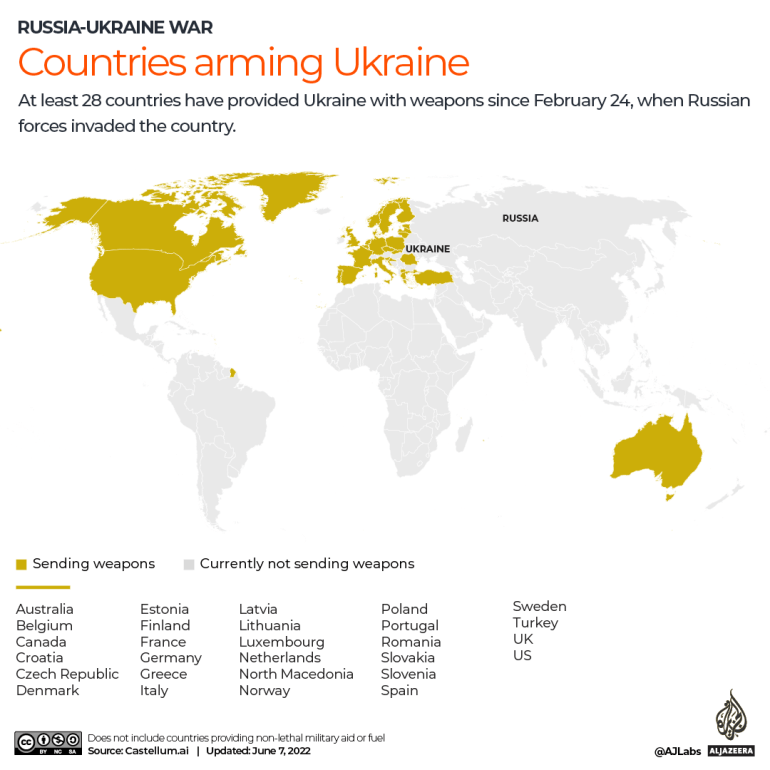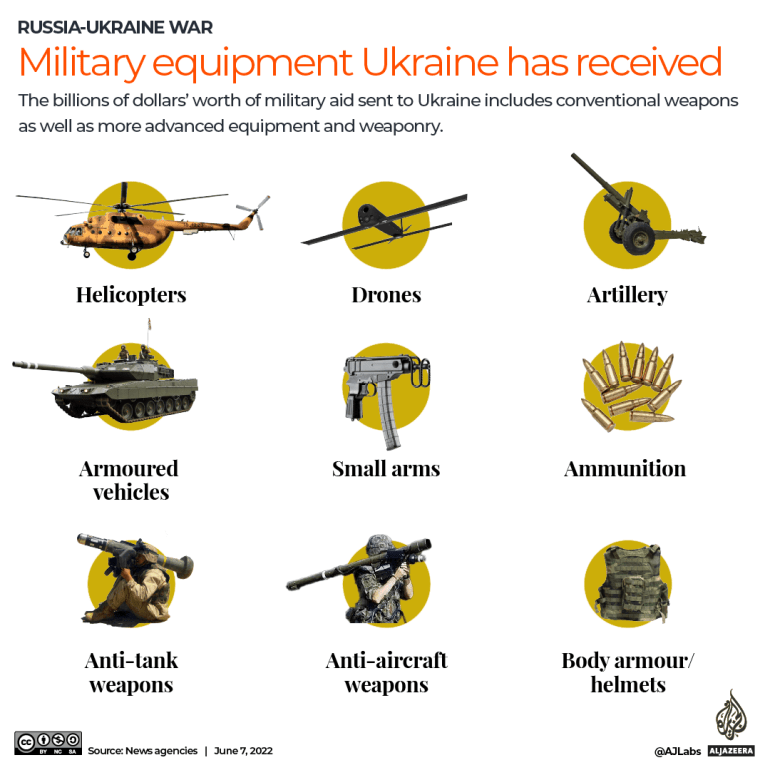NATO chief says alliance will not back down on Ukraine aid | NATO News
Ukraine is bracing itself for more cold and darkness due to Russian attacks on infrastructure, and NATO foreign ministers in the Romanian capital on Tuesday are focusing on ramping up military assistance for the war-torn nation, such as air-defence systems and ammunition.
Diplomats have acknowledged supply and capacity issues, however, as they also discuss non-lethal aid.
Part of this non-lethal aid – goods such as fuel, medical supplies, winter equipment and drone jammers – has been delivered through a NATO assistance package that allies can contribute to and which Stoltenberg aims to increase.
“NATO will continue to stand for Ukraine as long as it takes. We will not back down,” Stoltenberg said in a speech in Bucharest.
He added that the only way to get the right terms for a negotiation to begin would be for Ukraine to advance on the battlefield.
His comments were echoed by several ministers from the 30-member alliance, who were also joined by Finland and Sweden, as they look to secure full membership pending Turkish and Hungarian ratifications.
“The coming months will be a big test for us all. For Ukraine, it is existential, for us moral. We must continue helping Ukraine for as long as necessary,” Slovak Foreign Minister Rastislav Kacer said.
Al Jazeera’s Andrew Simmons, reporting from Bucharest, said that while Stoltenberg is promising a wide range of measures to support Ukraine, this is still “an alliance of 30 states in which consensus is the rule.
“Not all the states agree that military aid should be given to Ukraine so you have coalitions of the willing, so to speak,” Simmons said.
“There will be pledges of non-lethal aid by NATO itself, but there will also be pledges of actual military aid by individual states. The major issue right now is the winterisation of this war, the use of the cold as a weapon by Russia, targeted attacks on infrastructure in the country, and blackouts all across Ukraine.”
Ukrainian President Volodymyr Zelenskyy has warned citizens of new Russian attacks this week that could be as bad as last week’s, the worst yet, which left millions of people with no heat, water or power.
Russia acknowledges attacking Ukrainian infrastructure. It denies its intent is to hurt civilians.
“It is going to be a terrible winter for Ukraine, so we are working to strengthen our support for it to be resilient,” a senior European diplomat said.
Germany, which holds the G7 presidency, also scheduled a meeting of the Group of Seven rich nations with some partners on the sidelines of the NATO talks as it presses for ways to speed up reconstructing Ukraine’s energy infrastructure.
Washington is working with US firms and European nations to locate equipment that can help restore high-voltage transmission stations damaged by Russian missile attacks, a senior State Department official told reporters.
The official did not specify what form the assistance would take or how much it would be worth.
France and Germany are sending more than 100 power generators each to help stabilise the electricity grid.
“The reason Russia is continuing these war crimes is because it is losing ground,” a French official said, referring to the attacks on civilian infrastructure.
Simmons said “there is a desperate need for better air defence systems.
“There is a whole range of weaponry available, but there is resistance by some states about deploying them within Ukraine, and that is a major issue that is going to be discussed over the next 48 hours.”

On the military side, NATO keeps pushing weapons manufacturers to accelerate production but a second diplomat cautioned there were increasing problems with supply capacity.
“We are doing the maximum we can on deliveries, but there is a real problem. The Ukrainians know it. Even the US weapons industry despite its strength is having issues,” the diplomat said.
Highlighting the view from Baltic states, which have been at the forefront of the support for Kyiv, Lithuanian Foreign Minister Gabrielius Landsbergis urged the alliance to press ahead with deliveries.
“My message to fellow foreign ministers at today’s NATO meeting is simple: Keep calm and give tanks,” he said on Twitter, showing an image of a Ukrainian flag with a tank in the middle.
Ministers will also discuss Ukraine’s application for NATO membership. But they are likely to only confirm the alliance’s open-door policy while NATO membership still appears far away.
In 2008, a NATO summit at the same Palace of the Parliament in Bucharest, built under strongman Nicolae Ceausescu who was toppled in 1989, agreed that Ukraine would eventually become a member of the alliance.
However, leaders have stopped short of taking any concrete steps such as giving Ukraine a membership action plan that would lay out a timetable for bringing it closer to NATO.
Georgia, Moldova and Bosnia and Herzegovina will also attend the meeting on Wednesday as NATO looks to boost ties with the countries amid fears Russia is seeking to destabilise states beyond Ukraine.


Pingback: pgslot168
Pingback: plinko